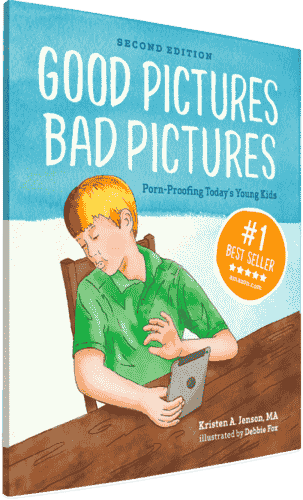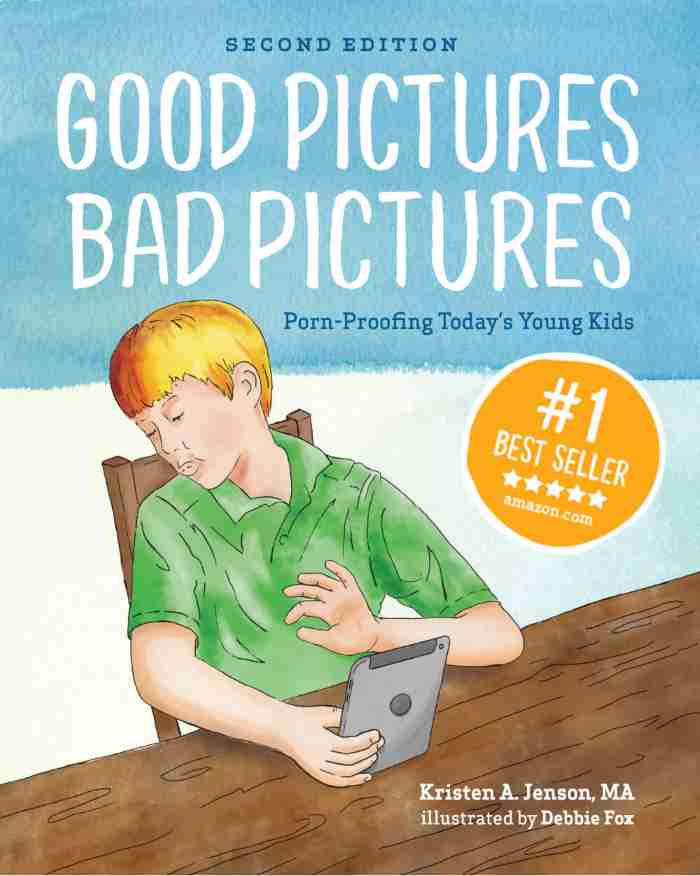

6 Mistakes Parents Make When They Learn Their Kid is Watching Porn
The first time I found porn on my husband’s computer, my body filled with dread, a sinking feeling in the pit of my stomach. My hands shook and my eyes welled with tears. I was angry, hurt, and afraid all at the same time.
If you’ve ever unexpectedly found porn on your child’s device, you may have felt the same shock. Since most kids will see pornography before they are 18, many parents like you are facing this distressing experience. Fortunately, there are great resources to help us learn how to handle this.
My husband fell into the porn trap through magazines and grainy videos, while kids today only have to take out the device in their pockets to access pornographic content. We need different tools to protect our children now, but one thing has not changed—the importance of the relationship between parent and child. From my husband’s experience, we learned that communication is key, shame is detrimental, and boundaries are essential.

Big mistakes parents make when their child is watching porn
Here are six things not to do when you find out your child is using porn.
Don’t feel sad if you have made some of these mistakes. Guess why they are on the list? Because they are natural reactions that so many parents have expressed! If you’ve ever had some of these responses, just let your kids know you have learned more now and would like a re-do.
1. Use shame as a deterrent
I used to think that if I made my kids feel badly enough about their mistakes, they would stop! Now I know that saying shaming things like, “I can’t believe you would do this!” could be as harmful as whatever they were doing in the first place.
Why? Because over time, they will eventually see themselves as a bad kid instead of a good kid who made a bad choice. That shame leads kids to hide. And hiding keeps kids from getting the help they need.
Most kids will automatically feel some sort of shame about watching something that is inappropriate. In order to help kids get past the shame and talk to us freely, we can speak in ways that help them know they are unconditionally loved no matter what choices they make.
How can you tell the difference between labeling a child and labeling their behavior? Here’s what that might sound like:
Shaming Language Helpful Behavior-Changing Language“I can’t believe you did this!”“I’m sorry you were faced with this. What are some of the consequences of your decision?”“I’m so disappointed in you! Only bad kids get into stuff like this.”“Help me understand - how did you feel when you decided to do this? How did you feel after?”“What made you think this was okay?”“It is hard to know what to do in situations like this. If you could do this over, what do you think you’d do next time?”
Kids who feel loved and accepted are kids who can make different choices next time.
2. Ignore the problem
There are two reasons why parents sometimes fail to talk to their kids even when they know they have seen pornography.
Some parents feel that pornography is a normal part of growing up and learning about sexuality. (Unfortunately, pornography has become so violent and degrading that kids can learn very disturbing and harmful lessons about sex online.)
Other parents are overcome with fear because they don’t know what to say or how their kids will react.
I know it’s difficult to have hard conversations with kids. I, too, have had huge knots in my stomach that tell me it would just feel better to move on to an easier topic.
Leaning into the discomfort to establish boundaries for our kids will pay off! Kids need a parent to help unravel those harmful images and explain why they are unrealistic, disrespectful and manipulative.
That is why we want to talk about it right away if our child looks at pornography.
One great way to get started talking to kids is to read a book together. Our Amazon best-selling book Good Pictures Bad Pictures: Porn-Proofing Today's Young Kids makes it easy!
[[CTA]]
3. Take away all technology
Sometimes when we first find porn on our child’s device, our immediate reaction is to take away all the devices, apps, and internet access that could possibly be a gateway to porn.
While rules and boundaries are necessary, we will do well to be sensitive to our kids’ online culture. When tweens and teens have grown up communicating with their friends through social media, then cutting off that access can actually breed isolation. And as many behavioral health professionals teach, the opposite of addiction is connection.
Also, if kids worry that you will take away their technology completely, they will be more likely to hide their exposure to pornography.
And finally, you want your kids to learn to use technology wisely while they have you to guide them, rather than making their mistakes out on their own when they leave home.
I understand the feeling of just wanting to shut it all down entirely. But if we become smothering and fearful, we can actually drive our kids away from us. It’s a balancing act for sure.
Have conversations about what you think is safe. Ask them what they think is safe. Set up rules and accountability with their tech. Practice situations they may encounter online and ask them how they might handle it. If they don’t know, you’ll be right there to guide them.
Related: Hey Kids! Freedom Begins in Your Brain
4. Make assumptions
When we are in a panic, our imaginations sometimes run wild. We can easily begin to believe the worst about how our child was exposed to porn, why they looked at it, and all the other things they may be trying to hide.
When you find your mind beginning to follow fears rather than facts, stop the train of thought! You don’t need to assume that your child is:
- Actively searching for porn.
- Addicted to pornography.
- Rebelling against you.
- Deliberately trying to deceive you.
- On the road to becoming a sex offender.
- Destined to fail in life in every possible way.
If you start searching for info about porn addiction, you will find a lot of heartbreaking stories along with recovery advice and addiction research. Worst-case scenarios can make us fearful and suspicious - but they will probably not ever apply to your child.
After all, many of the saddest stories happened because no one helped a young person out when they had a good chance for change. You have the opportunity to talk lovingly and calmly with your kids, which is exactly what they need to get back on track.
Deal with the situation as it is now, not how you fear it might be.
5. Blame yourself for everything
For the longest time, I saw my child’s behavior as a reflection of my parenting ability. If they were mean to another kid, I blamed myself. Clearly, I thought, if I was a good enough parent, they would be nice all the time. Ridiculous pattern of thinking, right? It is our job to guide them and help them become good citizens - but they are not us. They are not an extension of us. They are their own people and as such, their choices and experiences are their own.
If you find your child looking at pornography, it’s natural to take a step back and think, “Where did I go wrong?” Getting weighed down with regret can keep you from being the parent your kid needs right now.
The better question to ask is: “How can I help my child as we move forward?” What has happened has happened. It stinks. It would be nice if we could always step in and save the day before our children run into trouble, but we weren’t designed to always be with them or else our kids would have come equipped with Velcro.
The fact your child looked at porn does not make you a “bad parent” any more than it makes him or her a “bad kid.” Wallowing in our own shame only reinforces the shame that your child is most likely feeling. Accept what’s happened and jump in to help.
The most important thing is how your child feels and the reinforcement of how much you love and care for them—no matter what. Unconditionally loving your kid is life-changing, as this mom also discovered.
6. Have a “one-and-done” conversation
Now that you have had that first talk about their experience with pornography, it is mission-critical to follow up over time to see how they are doing. Top pornography addiction therapist, Dr. Adam Moore, encourages parents to engage in multiple conversations with their kids about pornography.
It’s not a one-time thing because pornography is never a one-time threat. Too many parents in the past thought that their kids would never look at pornography again after they were “caught.”
I get it: it’s awkward and not routine dinner-time conversation. Try bringing it up in the car when you’re alone together. Not having to make eye contact can be such a relief for kids when they have to talk about difficult things!
Need some questions to help you get the ball rolling? Reminding your kids that you are there to help them, not make them feel bad, is always a good place to start. Then, try these:
- Since the last time we talked, how are you doing with the porn stuff?
- Have you felt tempted to look for porn? If so, what do you do? Can we brainstorm some new ideas if you need them?
- Do thoughts of what you have seen keep coming back? What do you do when that happens? How can I help?
This is key: we all know that internet filters and app restrictions are not an unfailing fortress against pornography, so it’s best to combine tools with talk. In fact, it was through many, many deep conversations with me, with his close friends, and with God that my husband truly became free from his addiction.
Don’t get caught off-guard! It’s completely understandable that finding porn on your child’s device or hearing them confess their problem may make your heart skip a beat. We will naturally have emotional first reactions, but if we are prepared we can quickly shift into the calm, caring parent we want to be. Thinking this through ahead of time can make all the difference and change a potential confrontation into a moment of powerful connection.



Good Pictures Bad Pictures
"I really like the no-shame approach the author takes. It's so much more than just 'don't watch or look at porn.' It gave my children a real understanding about the brain and its natural response to pornography, how it can affect you if you look at it, and how to be prepared when you do come across it (since, let's face it... it's gonna happen at some point)." -Amazon Review by D.O.








